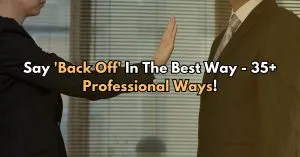Setting up and maintaining boundaries in a professional environment can be tough, especially when dealing with nosy coworkers or superiors who occasionally cross the line or ask personal things. In many hectic work situations, setting boundaries is not just beneficial—it’s necessary for preserving your mental well-being and ensuring a productive and courteous work atmosphere.
It’s not just about telling someone to back off; it’s about doing so in a way that maintains professionalism and respect within the workplace.
These tested and polite phrases can help you get your point across without escalating tensions.
Contents
- 1 Professionally Direct but Polite Alternatives
- 2 Professionally Firm and Assertive
- 3 Indirect but Firm
- 4 Professional yet Diplomatic Alternatives
- 5 Collaborative but Protective
- 6 Hierarchical Context (When speaking to a subordinate or colleague)
- 7 Encouraging Personal Growth
- 8 Legal or Privacy Context
- 9 Non-Verbal Cues That’ll Support Your Verbal Requests
- 10 Dealing With Those Who Repeatedly Ignore Boundaries
Professionally Direct but Polite Alternatives
1. Can I have some space to resolve this without additional input? I’d care to try it on my own.
2. I’m grateful for your offering to assist, but I must manage this assignment independently.
3. It’s great to have support, yet space to work through this alone would be best for now.
4. Thank you for your concern, I will reach out if I need some assistance later.
5. I care a lot about your input, but I’m currently prioritizing some personal tasks and need to work alone.
Professionally Firm and Assertive
1. Help me understand why you’re here, so we can both concentrate on what we need to do.
2. It’s important for me to work independently right now.
3. I need a minute to wrap my head around this, please stand back.
4. It’s crucial for me to work solo right now to resolve this properly.
Indirect but Firm
1. Your help is valuable, yet I must handle this task alone to fully grasp the concept.
2. Appreciate your willingness to jump in, but I’ve got to complete this part without help to build my confidence.
3. I appreciate your willingness, but learning to manage these tasks independently is essential for me right now.
4. I’ve got this, but I’ll definitely call you if things get too tricky.
5. I want to see if I can iron this out on my own, but thanks for the offer!
SUGGESTED: 17 Responses To Overcome Their ‘That’s Not My Job’ Attitude
Professional yet Diplomatic Alternatives
1. I’d appreciate it if we could take care of this table at another time; I have other things to manage right now.
2. It’s important to me, but let’s revisit it later. Right now, I need to focus independently.
3. I’ll take the lead on this for now and reach out with updates.
4. I’ll circle back to you after I’ve had a chance to sort through everything myself.
5. I think I should try to solve this myself first, but I’ll reach out if I need a second opinion.
Collaborative but Protective
1. Maybe if we divide the responsibilities, we could conquer this much quicker.
2. It might help if I take on a different part of the project to give you space to use your skills.
3. Let’s divvy this up—I think we’ll both benefit from a little autonomy.
4. Why don’t we each tackle a section? That might speed things up.
5. I’ll manage this part; why don’t you prep for [any other task]?
Hierarchical Context (When speaking to a subordinate or colleague)
1. You can leave this to me and see what else needs attention.2. I’ll give you a shout if I need your input here.
3. Why don’t you take a break? I can handle it from here.
4. I need some quiet to nail this down, thanks!

Encouraging Personal Growth
1. Could I take a shot at solving this problem by myself? I want to see what I can do.
2. I want to stretch my skills with this one—let me have a go.
3. I want to try this alone to build my confidence, hope that’s alright.
4. I want to step up and try this alone if that’s okay.
Legal or Privacy Context
1. I need a bit more personal space, please.
2. Can we approach this with a bit more privacy?
3. I want to keep these details private if that’s alright.
4. I would prefer if we handle this at a different time.
Non-Verbal Cues That’ll Support Your Verbal Requests
In any professional environment, your gestures are just as crucial as the words you choose. When telling someone politely to maintain a respectful distance, your body position and eye contact play significant roles.
A serious face combined with a direct look can reinforce your verbal request without uttering further words. Arms crossed and maintaining some physical space can subtly signal your need for distance, making your point without escalating the situation.
SUGGESTED: 17+ Top Responses When Coworkers Ask How Much You Make
Subtle moves, such as stepping back or adjusting your posture, also help convey that you’re serious without being confrontational.
Each gesture—from the way you stand to how you use hand gestures like a stop sign—serves to communicate your boundaries clearly and firmly, ensuring that both respect and professionalism are upheld.
Dealing With Those Who Repeatedly Ignore Boundaries
When dealing with individuals who ignore your requests and continuously cross boundaries, it’s vital to handle the situation with a cool head and a clear, firm voice. This approach ensures you express your feelings honestly without becoming overly emotional or harsh.
Such clarity in communication can make it evident to the other person that their behavior is bothering you and that it’s not acceptable in a professional environment.
If direct communication does not lead to a change in behavior, taking stronger actions may become necessary. This might include limiting interactions or avoiding spending time with the person in question.
It’s not about being mean, but rather about protecting your well-being and maintaining a respectful workplace.
Related Posts You May Like:
53 Most Perfect ‘How’s Work Going?’ Replies For Any Scenario

